
Sierra Leone, officially the Republic of Sierra Leone, is a country on the southwest coast of West Africa. It shares its southeastern border with Liberia and is bordered by Guinea to the north. With a land area of 71,740 km2 (27,699 sq mi), Sierra Leone has a tropical climate and with a variety of environments ranging from savannas to rainforests. According to the 2015 census, Sierra Leone has a population of 7,092,113, with Freetown serving as both the capital and largest city. The country is divided into five administrative regions, which are further subdivided into 16 districts.

Freetown is the capital and largest city of Sierra Leone. It is a major port city on the Atlantic Ocean and is located in the Western Area of the country. Freetown is Sierra Leone's major urban, economic, financial, cultural, educational and political centre, as it is the seat of the Government of Sierra Leone. The population of Freetown was 1,055,964 at the 2015 census.
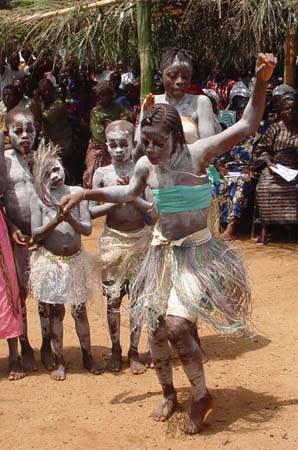
Sierra Leone's music is a mixture of native, French, British, West Indian and Creole musical genres.
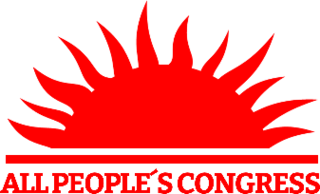
The All People's Congress (APC) is one of the two major political parties in Sierra Leone, the other being its main political rival the Sierra Leone People's Party (SLPP). The APC has been the main opposition party in Sierra Leone since 4 April 2018 when Julius Maada Bio of the SLPP won the 2018 presidential elections, though it maintains a majority in parliament.
Sooliman Ernest Rogers "Rogie", better known as S. E. Rogie, was a highlife and palm wine musician and guitarist from Sierra Leone.

Makeni is the largest city in the Northern Province of Sierra Leone. The city is the capital of Bombali District, and is the economic center of the Northern Province. Makeni is the fifth largest city in Sierra Leone by population. The city of Makeni had a population of 85,116 in the 2021 census. Makeni lies approximately 110 miles east of Freetown. Makeni is home to the University of Makeni, the largest private university in Sierra Leone.

Julius Maada Wonie Bio is a Sierra Leonean politician who has served as president of Sierra Leone since 4 April 2018. He is a retired brigadier in the Sierra Leone Army and was the military head of state of Sierra Leone from 16 January 1996 to 29 March 1996, in a military junta government known as the National Provisional Ruling Council (NPRC).
The Sierra Leone Civil War (1991–2002), or the Sierra Leonean Civil War, was a civil war in Sierra Leone that began on 23 March 1991 when the Revolutionary United Front (RUF), with support from the special forces of Liberian dictator Charles Taylor's National Patriotic Front of Liberia (NPFL), intervened in Sierra Leone in an attempt to overthrow the Joseph Momoh government. The resulting civil war lasted almost 11 years, and had over 50,000, up to 70,000, casualties in total; an estimated 2.5 million people were displaced during the conflict.

Ernest Bai Koroma is a Sierra Leonean politician who served as the fourth President of Sierra Leone from 17 September 2007 to 4 April 2018.

The Limba people are an ethnic group in Sierra Leone. They represent 12.4% of the total population, making them the third largest ethnic group in Sierra Leone. The Limba are based in the north of the country across seven provinces, but are predominantly found in the Northern Province of Sierra Leone.

Sierra Leone's Refugee All Stars is a documentary film about the musical band of the same name composed entirely of refugees from Freetown displaced to Guinea during the 1991-2002 civil war in Sierra Leone.
Morlai Bai Kamara Jr. is a Sierra Leonean singer-songwriter, record producer, performer and activist based in Brussels, Belgium. Bai was born in Bo Town, Sierra Leone, and spent his childhood years there. His father was a politician and his mother was one of Sierra Leone's longest serving ambassadors. His exposure to the harsh realities of African politics at a young age has led to the themes of corruption, abuse of power, and social justice being prevalent in much of his music today.

Dr Samura Mathew Wilson Kamara is a Sierra Leonean politician and economist. He was the All Peoples Congress (APC) Party's candidate for President of Sierra Leone in the 2018 election. He was the Minister of Foreign Affairs and International Cooperation of Sierra Leone from 2012 to 2017, Minister of Finance and Economic Development from 2009 to 2013, Governor of the Bank of Sierra Leone from 2007 to 2009, Financial Secretary in the Ministry of Finance during President Ahmad Tejan Kabbah's administration.
Mohamed Saccoh(born in Koidu Town, Sierra Leone), better known by his stage name K-Man, is a Sierra Leonean rapper and one of the most famous musicians from Sierra Leone. K-Man is known for his soft rap tone. He rapped mainly in English and the Krio language as well as occasionally in the Madinka language.
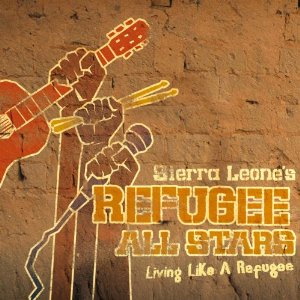
Living Like a Refugee is the debut album from Sierra Leonian band Sierra Leone's Refugee All Stars, released in the Europe on 25 September 2006 and in the United States on 26 September 2006.

Alhaji Usman Boie Kamara is a Sierra Leonean politician, businessman and mining engineer who has been Minister of Trade and Industry of Sierra Leone since 2013. He previously worked as director of the Sierra Leone National Diamond Mining Company (NDMC).

Rise & Shine (2010) is the second album by Sierra Leone's Refugee All Stars, following their debut album Living Like a Refugee (2006). The album was produced by Steve Berlin, renowned for his work with Los Lobos, Angélique Kidjo, Michelle Shocked, Rickie Lee Jones and Ozomatli, and recorded in their hometown of Freetown, Sierra Leone and New Orleans, Louisiana. Reflecting the influences of both recording locations, the album's sound is "a fusion of traditional West African music and roots reggae, inflected with New Orleans styles."
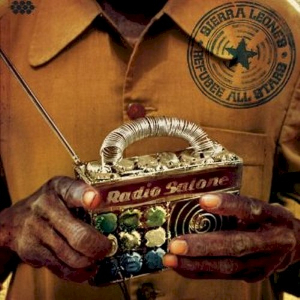
Radio Salone (2012) is the third album from Sierra Leone's Refugee All Stars. It was produced by artist and producer Victor Axelrod aka "Ticklah," who has worked with Sharon Jones & The Dap-Kings, Amy Winehouse and the Easy Star All Stars, and recorded at Dunham Studios in Brooklyn, NY.
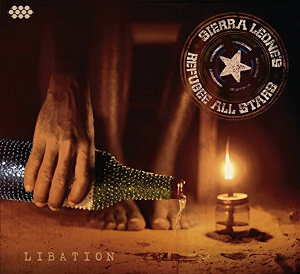
Libation (2014) is the fourth album by Sierra Leone's Refugee All Stars, following Radio Salone (2012). It was produced by Canadian singer-songwriter Chris Velan, mixed by Iestyn Polson, and recorded at Lane Gibson Recording & Mastering in Charlotte, Vermont. The album celebrates the band's 10-year anniversary with a "return to roots, specifically the acoustic "around the campfire" vibe of their earliest recordings." Their sound combines elements of highlife, palm wine, maringa, baskeda and gumbe with modern dubstep and reggae.
Jimmy B, born Jimmy Bangura, is a Sierra Leonean musician, filmmaker, producer and entertainer. He has been called the "Godfather of Sierra Leone music".

















